Leadership Styles and Tactics for Supply Chain Transformation at Vodafone
VerifiedAdded on 2023/01/11
|11
|2991
|56
AI Summary
This report discusses the leadership style that Schultz could have adopted while transforming the global chain supply function at Vodafone. It also explores the influencing styles that Schultz could have used to effectively engage with key business stakeholders. Additionally, it suggests tactics that Vodafone and the SCM team could have used to influence external stakeholders to overcome challenges faced by Schultz. Furthermore, it discusses effective change management methods, specifically Lewin's Change Management Model, for supply chain transformation.
Contribute Materials
Your contribution can guide someone’s learning journey. Share your
documents today.
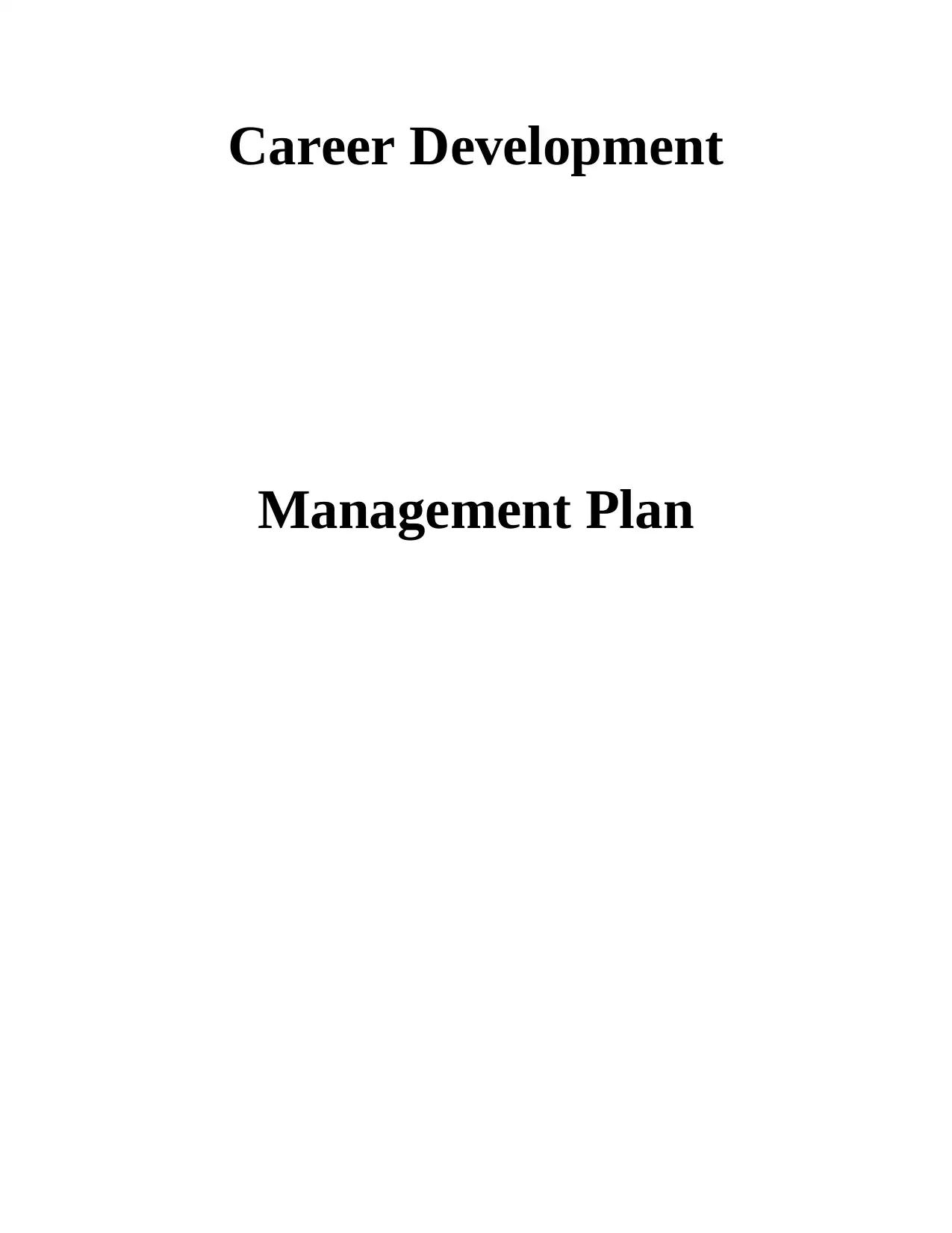
Career Development
Management Plan
Management Plan
Secure Best Marks with AI Grader
Need help grading? Try our AI Grader for instant feedback on your assignments.
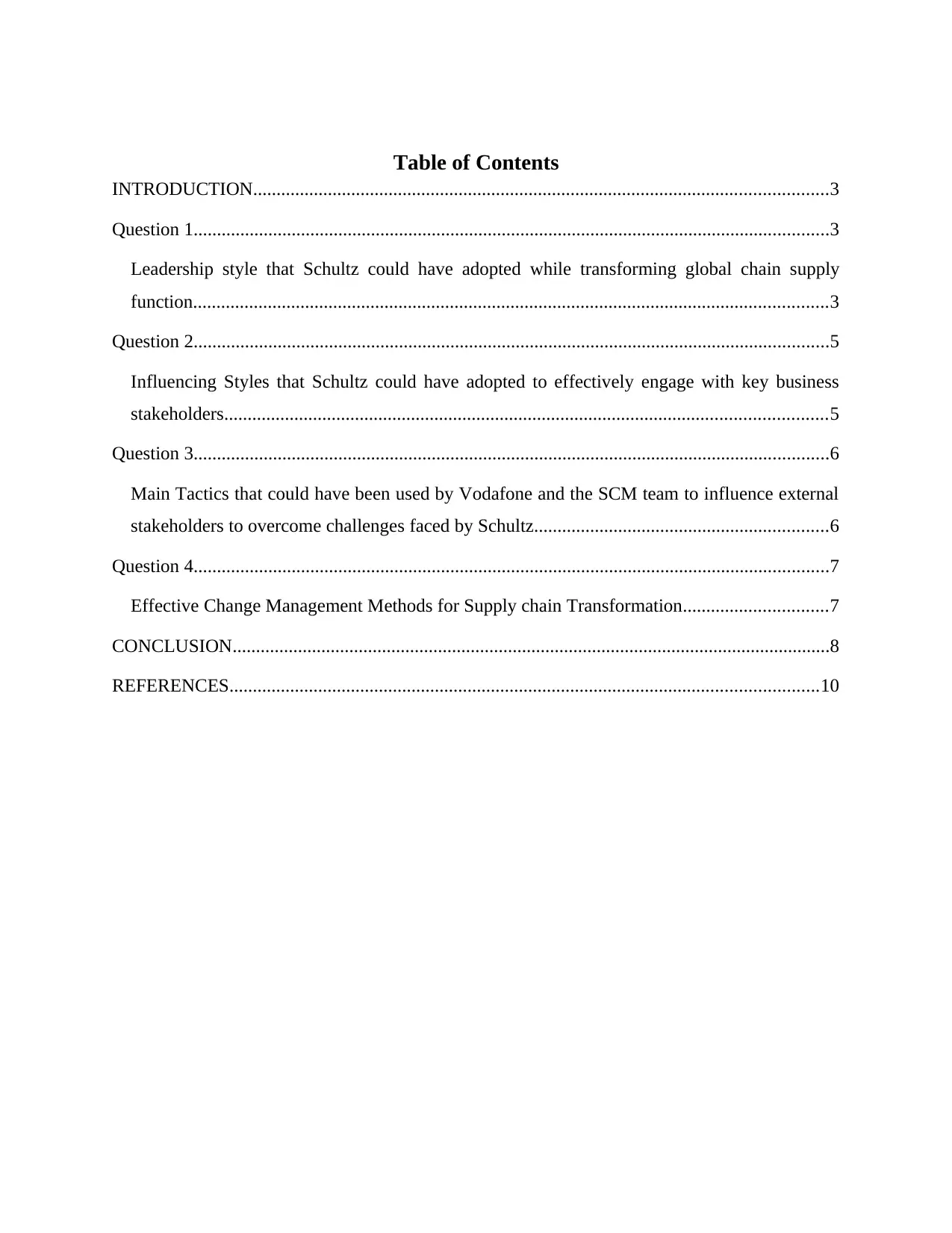
Table of Contents
INTRODUCTION...........................................................................................................................3
Question 1........................................................................................................................................3
Leadership style that Schultz could have adopted while transforming global chain supply
function........................................................................................................................................3
Question 2........................................................................................................................................5
Influencing Styles that Schultz could have adopted to effectively engage with key business
stakeholders.................................................................................................................................5
Question 3........................................................................................................................................6
Main Tactics that could have been used by Vodafone and the SCM team to influence external
stakeholders to overcome challenges faced by Schultz...............................................................6
Question 4........................................................................................................................................7
Effective Change Management Methods for Supply chain Transformation...............................7
CONCLUSION................................................................................................................................8
REFERENCES..............................................................................................................................10
INTRODUCTION...........................................................................................................................3
Question 1........................................................................................................................................3
Leadership style that Schultz could have adopted while transforming global chain supply
function........................................................................................................................................3
Question 2........................................................................................................................................5
Influencing Styles that Schultz could have adopted to effectively engage with key business
stakeholders.................................................................................................................................5
Question 3........................................................................................................................................6
Main Tactics that could have been used by Vodafone and the SCM team to influence external
stakeholders to overcome challenges faced by Schultz...............................................................6
Question 4........................................................................................................................................7
Effective Change Management Methods for Supply chain Transformation...............................7
CONCLUSION................................................................................................................................8
REFERENCES..............................................................................................................................10
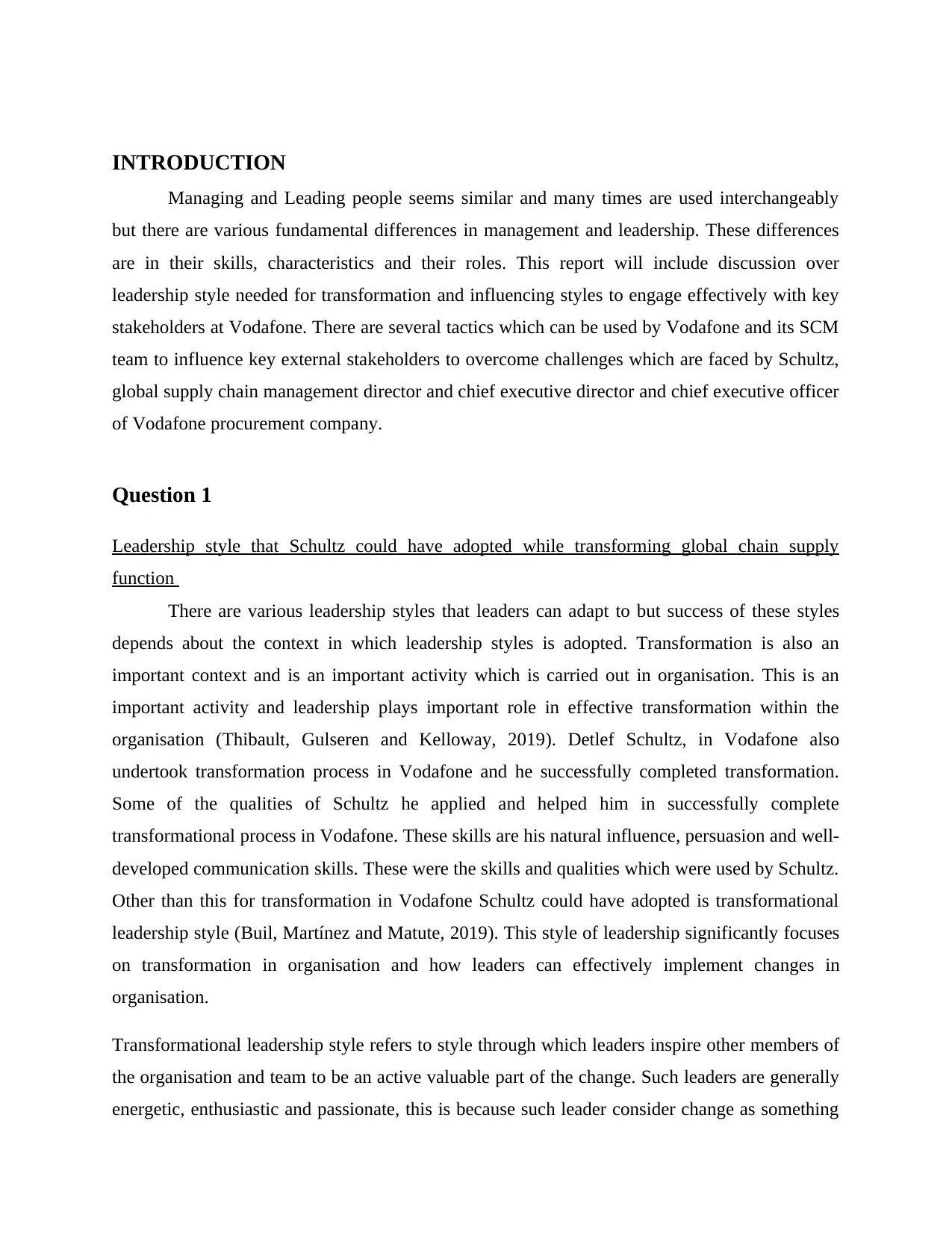
INTRODUCTION
Managing and Leading people seems similar and many times are used interchangeably
but there are various fundamental differences in management and leadership. These differences
are in their skills, characteristics and their roles. This report will include discussion over
leadership style needed for transformation and influencing styles to engage effectively with key
stakeholders at Vodafone. There are several tactics which can be used by Vodafone and its SCM
team to influence key external stakeholders to overcome challenges which are faced by Schultz,
global supply chain management director and chief executive director and chief executive officer
of Vodafone procurement company.
Question 1
Leadership style that Schultz could have adopted while transforming global chain supply
function
There are various leadership styles that leaders can adapt to but success of these styles
depends about the context in which leadership styles is adopted. Transformation is also an
important context and is an important activity which is carried out in organisation. This is an
important activity and leadership plays important role in effective transformation within the
organisation (Thibault, Gulseren and Kelloway, 2019). Detlef Schultz, in Vodafone also
undertook transformation process in Vodafone and he successfully completed transformation.
Some of the qualities of Schultz he applied and helped him in successfully complete
transformational process in Vodafone. These skills are his natural influence, persuasion and well-
developed communication skills. These were the skills and qualities which were used by Schultz.
Other than this for transformation in Vodafone Schultz could have adopted is transformational
leadership style (Buil, Martínez and Matute, 2019). This style of leadership significantly focuses
on transformation in organisation and how leaders can effectively implement changes in
organisation.
Transformational leadership style refers to style through which leaders inspire other members of
the organisation and team to be an active valuable part of the change. Such leaders are generally
energetic, enthusiastic and passionate, this is because such leader consider change as something
Managing and Leading people seems similar and many times are used interchangeably
but there are various fundamental differences in management and leadership. These differences
are in their skills, characteristics and their roles. This report will include discussion over
leadership style needed for transformation and influencing styles to engage effectively with key
stakeholders at Vodafone. There are several tactics which can be used by Vodafone and its SCM
team to influence key external stakeholders to overcome challenges which are faced by Schultz,
global supply chain management director and chief executive director and chief executive officer
of Vodafone procurement company.
Question 1
Leadership style that Schultz could have adopted while transforming global chain supply
function
There are various leadership styles that leaders can adapt to but success of these styles
depends about the context in which leadership styles is adopted. Transformation is also an
important context and is an important activity which is carried out in organisation. This is an
important activity and leadership plays important role in effective transformation within the
organisation (Thibault, Gulseren and Kelloway, 2019). Detlef Schultz, in Vodafone also
undertook transformation process in Vodafone and he successfully completed transformation.
Some of the qualities of Schultz he applied and helped him in successfully complete
transformational process in Vodafone. These skills are his natural influence, persuasion and well-
developed communication skills. These were the skills and qualities which were used by Schultz.
Other than this for transformation in Vodafone Schultz could have adopted is transformational
leadership style (Buil, Martínez and Matute, 2019). This style of leadership significantly focuses
on transformation in organisation and how leaders can effectively implement changes in
organisation.
Transformational leadership style refers to style through which leaders inspire other members of
the organisation and team to be an active valuable part of the change. Such leaders are generally
energetic, enthusiastic and passionate, this is because such leader consider change as something
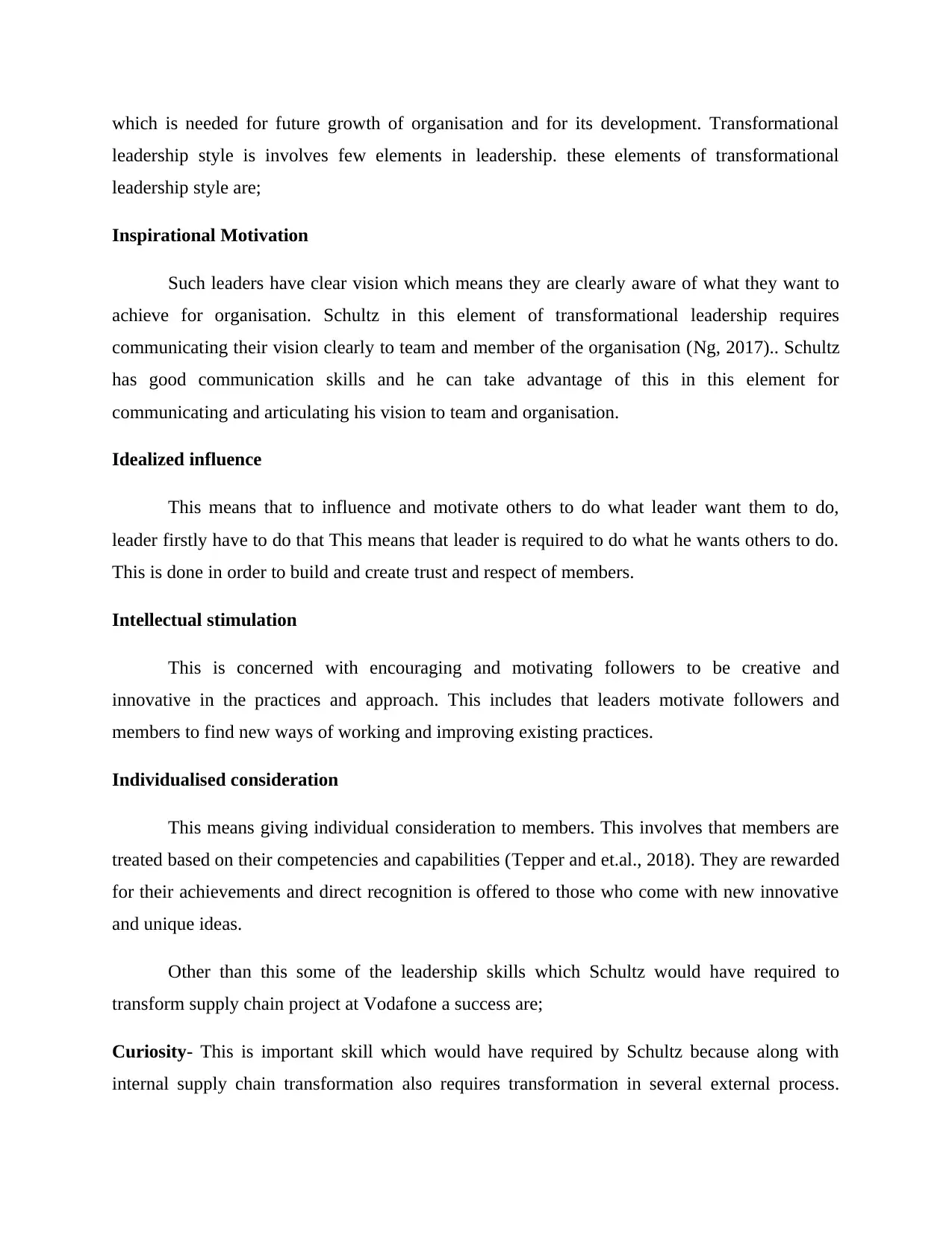
which is needed for future growth of organisation and for its development. Transformational
leadership style is involves few elements in leadership. these elements of transformational
leadership style are;
Inspirational Motivation
Such leaders have clear vision which means they are clearly aware of what they want to
achieve for organisation. Schultz in this element of transformational leadership requires
communicating their vision clearly to team and member of the organisation (Ng, 2017).. Schultz
has good communication skills and he can take advantage of this in this element for
communicating and articulating his vision to team and organisation.
Idealized influence
This means that to influence and motivate others to do what leader want them to do,
leader firstly have to do that This means that leader is required to do what he wants others to do.
This is done in order to build and create trust and respect of members.
Intellectual stimulation
This is concerned with encouraging and motivating followers to be creative and
innovative in the practices and approach. This includes that leaders motivate followers and
members to find new ways of working and improving existing practices.
Individualised consideration
This means giving individual consideration to members. This involves that members are
treated based on their competencies and capabilities (Tepper and et.al., 2018). They are rewarded
for their achievements and direct recognition is offered to those who come with new innovative
and unique ideas.
Other than this some of the leadership skills which Schultz would have required to
transform supply chain project at Vodafone a success are;
Curiosity- This is important skill which would have required by Schultz because along with
internal supply chain transformation also requires transformation in several external process.
leadership style is involves few elements in leadership. these elements of transformational
leadership style are;
Inspirational Motivation
Such leaders have clear vision which means they are clearly aware of what they want to
achieve for organisation. Schultz in this element of transformational leadership requires
communicating their vision clearly to team and member of the organisation (Ng, 2017).. Schultz
has good communication skills and he can take advantage of this in this element for
communicating and articulating his vision to team and organisation.
Idealized influence
This means that to influence and motivate others to do what leader want them to do,
leader firstly have to do that This means that leader is required to do what he wants others to do.
This is done in order to build and create trust and respect of members.
Intellectual stimulation
This is concerned with encouraging and motivating followers to be creative and
innovative in the practices and approach. This includes that leaders motivate followers and
members to find new ways of working and improving existing practices.
Individualised consideration
This means giving individual consideration to members. This involves that members are
treated based on their competencies and capabilities (Tepper and et.al., 2018). They are rewarded
for their achievements and direct recognition is offered to those who come with new innovative
and unique ideas.
Other than this some of the leadership skills which Schultz would have required to
transform supply chain project at Vodafone a success are;
Curiosity- This is important skill which would have required by Schultz because along with
internal supply chain transformation also requires transformation in several external process.
Secure Best Marks with AI Grader
Need help grading? Try our AI Grader for instant feedback on your assignments.
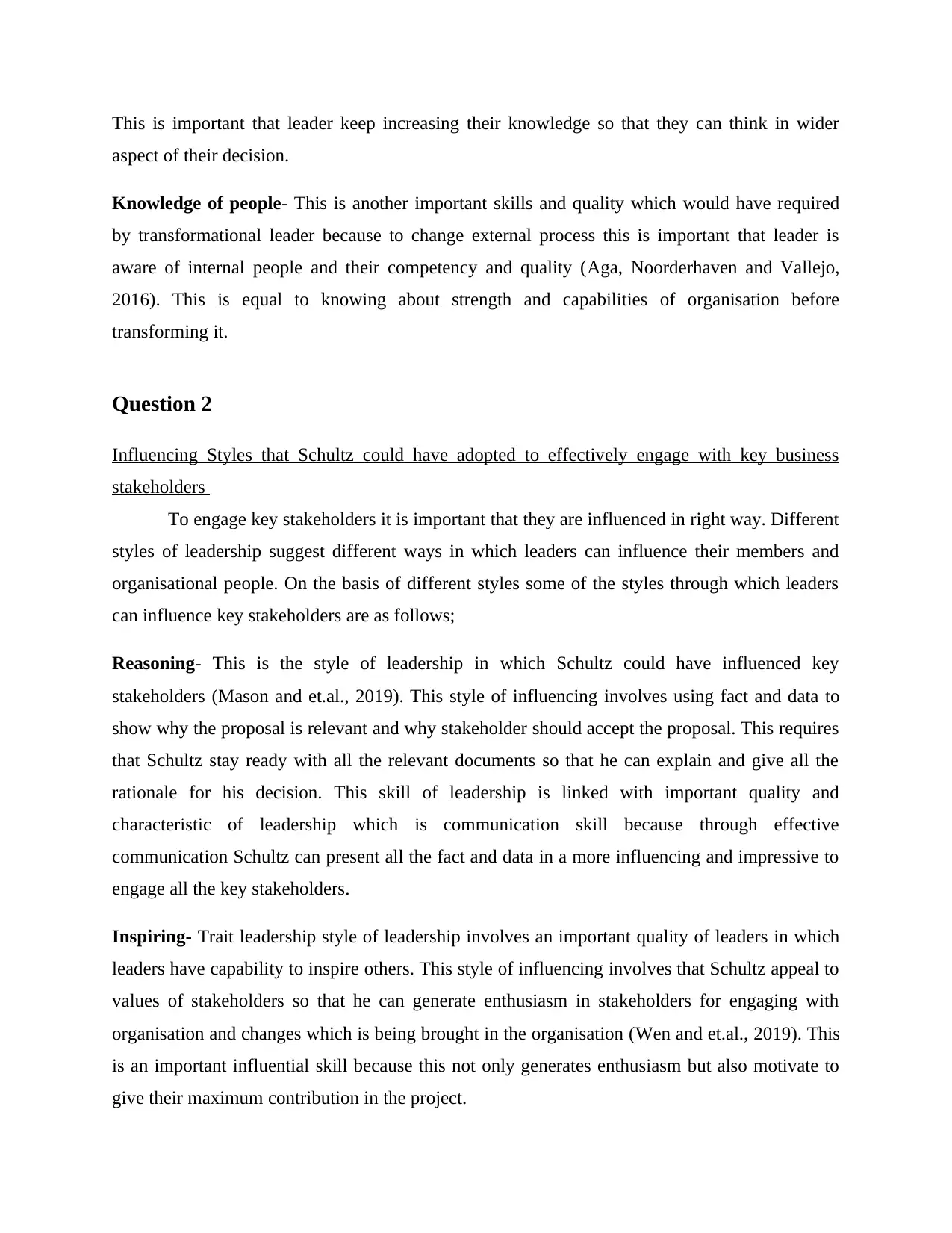
This is important that leader keep increasing their knowledge so that they can think in wider
aspect of their decision.
Knowledge of people- This is another important skills and quality which would have required
by transformational leader because to change external process this is important that leader is
aware of internal people and their competency and quality (Aga, Noorderhaven and Vallejo,
2016). This is equal to knowing about strength and capabilities of organisation before
transforming it.
Question 2
Influencing Styles that Schultz could have adopted to effectively engage with key business
stakeholders
To engage key stakeholders it is important that they are influenced in right way. Different
styles of leadership suggest different ways in which leaders can influence their members and
organisational people. On the basis of different styles some of the styles through which leaders
can influence key stakeholders are as follows;
Reasoning- This is the style of leadership in which Schultz could have influenced key
stakeholders (Mason and et.al., 2019). This style of influencing involves using fact and data to
show why the proposal is relevant and why stakeholder should accept the proposal. This requires
that Schultz stay ready with all the relevant documents so that he can explain and give all the
rationale for his decision. This skill of leadership is linked with important quality and
characteristic of leadership which is communication skill because through effective
communication Schultz can present all the fact and data in a more influencing and impressive to
engage all the key stakeholders.
Inspiring- Trait leadership style of leadership involves an important quality of leaders in which
leaders have capability to inspire others. This style of influencing involves that Schultz appeal to
values of stakeholders so that he can generate enthusiasm in stakeholders for engaging with
organisation and changes which is being brought in the organisation (Wen and et.al., 2019). This
is an important influential skill because this not only generates enthusiasm but also motivate to
give their maximum contribution in the project.
aspect of their decision.
Knowledge of people- This is another important skills and quality which would have required
by transformational leader because to change external process this is important that leader is
aware of internal people and their competency and quality (Aga, Noorderhaven and Vallejo,
2016). This is equal to knowing about strength and capabilities of organisation before
transforming it.
Question 2
Influencing Styles that Schultz could have adopted to effectively engage with key business
stakeholders
To engage key stakeholders it is important that they are influenced in right way. Different
styles of leadership suggest different ways in which leaders can influence their members and
organisational people. On the basis of different styles some of the styles through which leaders
can influence key stakeholders are as follows;
Reasoning- This is the style of leadership in which Schultz could have influenced key
stakeholders (Mason and et.al., 2019). This style of influencing involves using fact and data to
show why the proposal is relevant and why stakeholder should accept the proposal. This requires
that Schultz stay ready with all the relevant documents so that he can explain and give all the
rationale for his decision. This skill of leadership is linked with important quality and
characteristic of leadership which is communication skill because through effective
communication Schultz can present all the fact and data in a more influencing and impressive to
engage all the key stakeholders.
Inspiring- Trait leadership style of leadership involves an important quality of leaders in which
leaders have capability to inspire others. This style of influencing involves that Schultz appeal to
values of stakeholders so that he can generate enthusiasm in stakeholders for engaging with
organisation and changes which is being brought in the organisation (Wen and et.al., 2019). This
is an important influential skill because this not only generates enthusiasm but also motivate to
give their maximum contribution in the project.
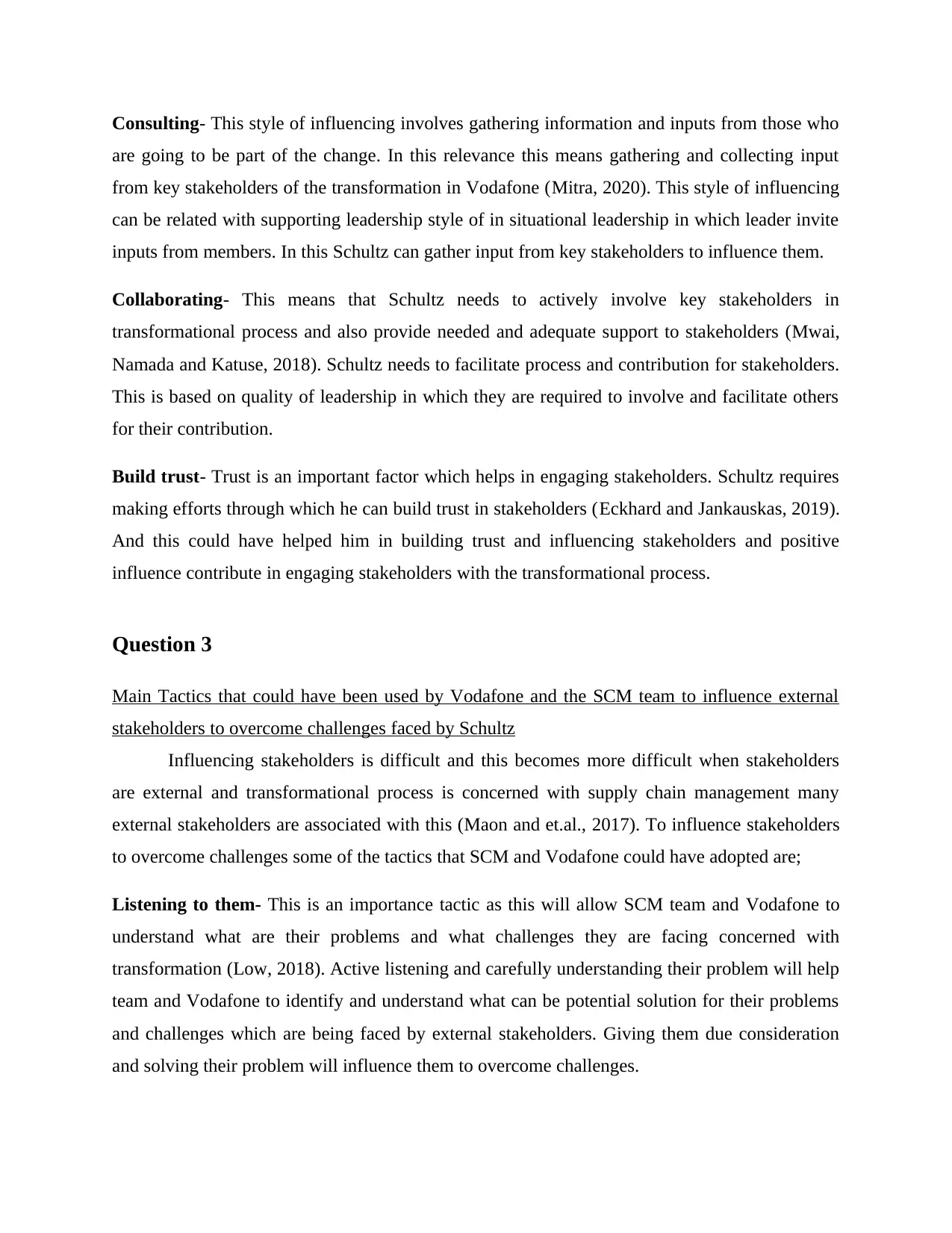
Consulting- This style of influencing involves gathering information and inputs from those who
are going to be part of the change. In this relevance this means gathering and collecting input
from key stakeholders of the transformation in Vodafone (Mitra, 2020). This style of influencing
can be related with supporting leadership style of in situational leadership in which leader invite
inputs from members. In this Schultz can gather input from key stakeholders to influence them.
Collaborating- This means that Schultz needs to actively involve key stakeholders in
transformational process and also provide needed and adequate support to stakeholders (Mwai,
Namada and Katuse, 2018). Schultz needs to facilitate process and contribution for stakeholders.
This is based on quality of leadership in which they are required to involve and facilitate others
for their contribution.
Build trust- Trust is an important factor which helps in engaging stakeholders. Schultz requires
making efforts through which he can build trust in stakeholders (Eckhard and Jankauskas, 2019).
And this could have helped him in building trust and influencing stakeholders and positive
influence contribute in engaging stakeholders with the transformational process.
Question 3
Main Tactics that could have been used by Vodafone and the SCM team to influence external
stakeholders to overcome challenges faced by Schultz
Influencing stakeholders is difficult and this becomes more difficult when stakeholders
are external and transformational process is concerned with supply chain management many
external stakeholders are associated with this (Maon and et.al., 2017). To influence stakeholders
to overcome challenges some of the tactics that SCM and Vodafone could have adopted are;
Listening to them- This is an importance tactic as this will allow SCM team and Vodafone to
understand what are their problems and what challenges they are facing concerned with
transformation (Low, 2018). Active listening and carefully understanding their problem will help
team and Vodafone to identify and understand what can be potential solution for their problems
and challenges which are being faced by external stakeholders. Giving them due consideration
and solving their problem will influence them to overcome challenges.
are going to be part of the change. In this relevance this means gathering and collecting input
from key stakeholders of the transformation in Vodafone (Mitra, 2020). This style of influencing
can be related with supporting leadership style of in situational leadership in which leader invite
inputs from members. In this Schultz can gather input from key stakeholders to influence them.
Collaborating- This means that Schultz needs to actively involve key stakeholders in
transformational process and also provide needed and adequate support to stakeholders (Mwai,
Namada and Katuse, 2018). Schultz needs to facilitate process and contribution for stakeholders.
This is based on quality of leadership in which they are required to involve and facilitate others
for their contribution.
Build trust- Trust is an important factor which helps in engaging stakeholders. Schultz requires
making efforts through which he can build trust in stakeholders (Eckhard and Jankauskas, 2019).
And this could have helped him in building trust and influencing stakeholders and positive
influence contribute in engaging stakeholders with the transformational process.
Question 3
Main Tactics that could have been used by Vodafone and the SCM team to influence external
stakeholders to overcome challenges faced by Schultz
Influencing stakeholders is difficult and this becomes more difficult when stakeholders
are external and transformational process is concerned with supply chain management many
external stakeholders are associated with this (Maon and et.al., 2017). To influence stakeholders
to overcome challenges some of the tactics that SCM and Vodafone could have adopted are;
Listening to them- This is an importance tactic as this will allow SCM team and Vodafone to
understand what are their problems and what challenges they are facing concerned with
transformation (Low, 2018). Active listening and carefully understanding their problem will help
team and Vodafone to identify and understand what can be potential solution for their problems
and challenges which are being faced by external stakeholders. Giving them due consideration
and solving their problem will influence them to overcome challenges.
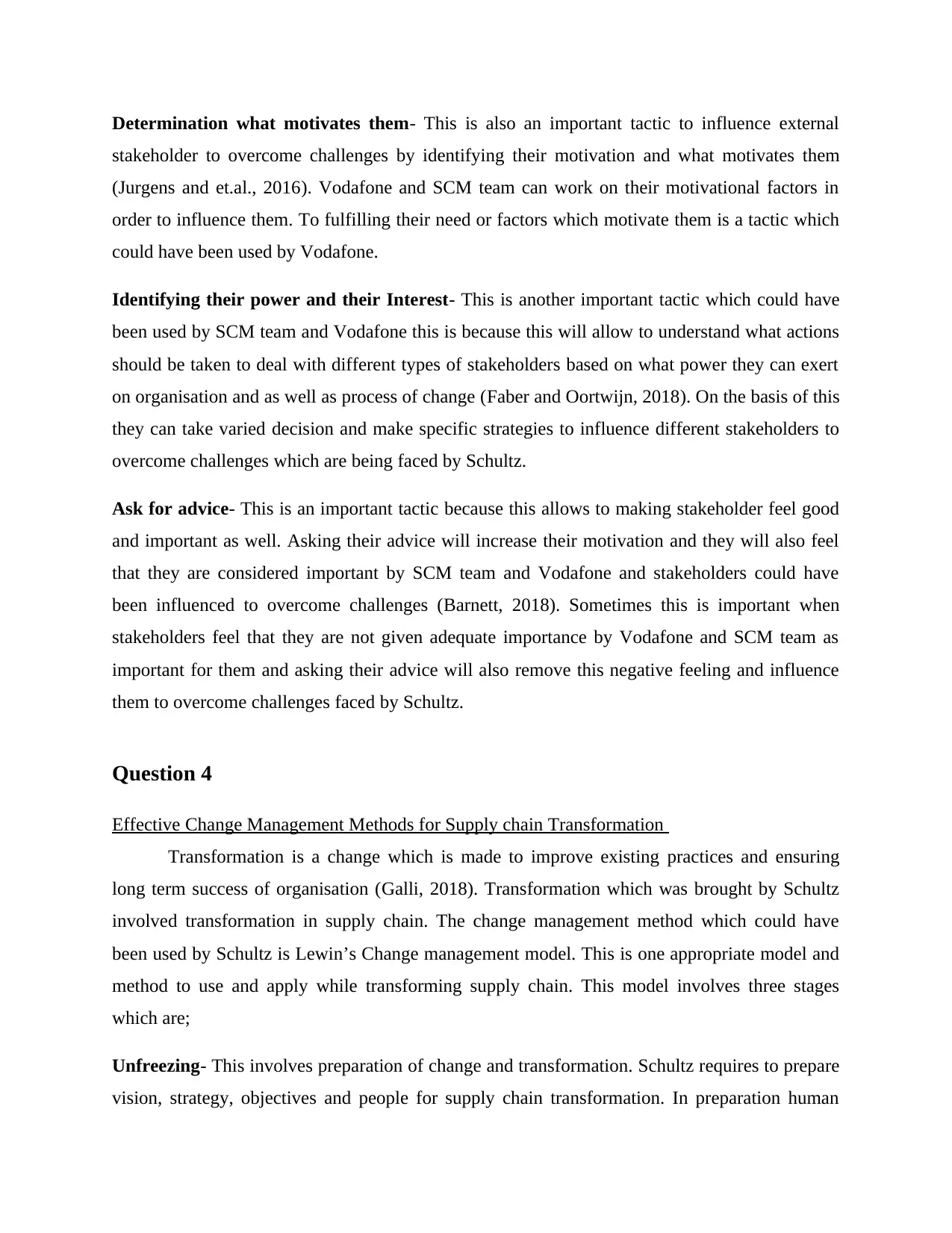
Determination what motivates them- This is also an important tactic to influence external
stakeholder to overcome challenges by identifying their motivation and what motivates them
(Jurgens and et.al., 2016). Vodafone and SCM team can work on their motivational factors in
order to influence them. To fulfilling their need or factors which motivate them is a tactic which
could have been used by Vodafone.
Identifying their power and their Interest- This is another important tactic which could have
been used by SCM team and Vodafone this is because this will allow to understand what actions
should be taken to deal with different types of stakeholders based on what power they can exert
on organisation and as well as process of change (Faber and Oortwijn, 2018). On the basis of this
they can take varied decision and make specific strategies to influence different stakeholders to
overcome challenges which are being faced by Schultz.
Ask for advice- This is an important tactic because this allows to making stakeholder feel good
and important as well. Asking their advice will increase their motivation and they will also feel
that they are considered important by SCM team and Vodafone and stakeholders could have
been influenced to overcome challenges (Barnett, 2018). Sometimes this is important when
stakeholders feel that they are not given adequate importance by Vodafone and SCM team as
important for them and asking their advice will also remove this negative feeling and influence
them to overcome challenges faced by Schultz.
Question 4
Effective Change Management Methods for Supply chain Transformation
Transformation is a change which is made to improve existing practices and ensuring
long term success of organisation (Galli, 2018). Transformation which was brought by Schultz
involved transformation in supply chain. The change management method which could have
been used by Schultz is Lewin’s Change management model. This is one appropriate model and
method to use and apply while transforming supply chain. This model involves three stages
which are;
Unfreezing- This involves preparation of change and transformation. Schultz requires to prepare
vision, strategy, objectives and people for supply chain transformation. In preparation human
stakeholder to overcome challenges by identifying their motivation and what motivates them
(Jurgens and et.al., 2016). Vodafone and SCM team can work on their motivational factors in
order to influence them. To fulfilling their need or factors which motivate them is a tactic which
could have been used by Vodafone.
Identifying their power and their Interest- This is another important tactic which could have
been used by SCM team and Vodafone this is because this will allow to understand what actions
should be taken to deal with different types of stakeholders based on what power they can exert
on organisation and as well as process of change (Faber and Oortwijn, 2018). On the basis of this
they can take varied decision and make specific strategies to influence different stakeholders to
overcome challenges which are being faced by Schultz.
Ask for advice- This is an important tactic because this allows to making stakeholder feel good
and important as well. Asking their advice will increase their motivation and they will also feel
that they are considered important by SCM team and Vodafone and stakeholders could have
been influenced to overcome challenges (Barnett, 2018). Sometimes this is important when
stakeholders feel that they are not given adequate importance by Vodafone and SCM team as
important for them and asking their advice will also remove this negative feeling and influence
them to overcome challenges faced by Schultz.
Question 4
Effective Change Management Methods for Supply chain Transformation
Transformation is a change which is made to improve existing practices and ensuring
long term success of organisation (Galli, 2018). Transformation which was brought by Schultz
involved transformation in supply chain. The change management method which could have
been used by Schultz is Lewin’s Change management model. This is one appropriate model and
method to use and apply while transforming supply chain. This model involves three stages
which are;
Unfreezing- This involves preparation of change and transformation. Schultz requires to prepare
vision, strategy, objectives and people for supply chain transformation. In preparation human
Paraphrase This Document
Need a fresh take? Get an instant paraphrase of this document with our AI Paraphraser
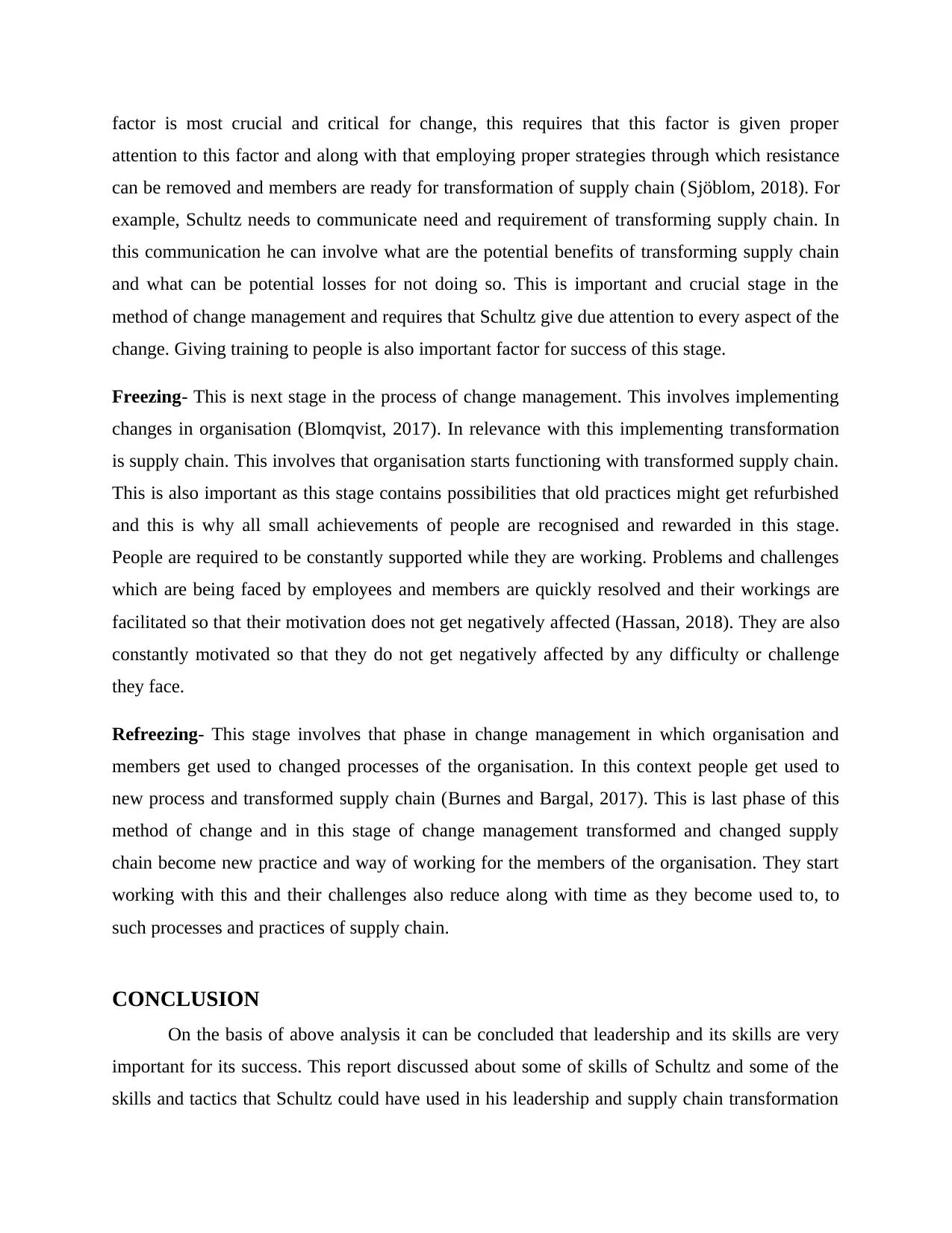
factor is most crucial and critical for change, this requires that this factor is given proper
attention to this factor and along with that employing proper strategies through which resistance
can be removed and members are ready for transformation of supply chain (Sjöblom, 2018). For
example, Schultz needs to communicate need and requirement of transforming supply chain. In
this communication he can involve what are the potential benefits of transforming supply chain
and what can be potential losses for not doing so. This is important and crucial stage in the
method of change management and requires that Schultz give due attention to every aspect of the
change. Giving training to people is also important factor for success of this stage.
Freezing- This is next stage in the process of change management. This involves implementing
changes in organisation (Blomqvist, 2017). In relevance with this implementing transformation
is supply chain. This involves that organisation starts functioning with transformed supply chain.
This is also important as this stage contains possibilities that old practices might get refurbished
and this is why all small achievements of people are recognised and rewarded in this stage.
People are required to be constantly supported while they are working. Problems and challenges
which are being faced by employees and members are quickly resolved and their workings are
facilitated so that their motivation does not get negatively affected (Hassan, 2018). They are also
constantly motivated so that they do not get negatively affected by any difficulty or challenge
they face.
Refreezing- This stage involves that phase in change management in which organisation and
members get used to changed processes of the organisation. In this context people get used to
new process and transformed supply chain (Burnes and Bargal, 2017). This is last phase of this
method of change and in this stage of change management transformed and changed supply
chain become new practice and way of working for the members of the organisation. They start
working with this and their challenges also reduce along with time as they become used to, to
such processes and practices of supply chain.
CONCLUSION
On the basis of above analysis it can be concluded that leadership and its skills are very
important for its success. This report discussed about some of skills of Schultz and some of the
skills and tactics that Schultz could have used in his leadership and supply chain transformation
attention to this factor and along with that employing proper strategies through which resistance
can be removed and members are ready for transformation of supply chain (Sjöblom, 2018). For
example, Schultz needs to communicate need and requirement of transforming supply chain. In
this communication he can involve what are the potential benefits of transforming supply chain
and what can be potential losses for not doing so. This is important and crucial stage in the
method of change management and requires that Schultz give due attention to every aspect of the
change. Giving training to people is also important factor for success of this stage.
Freezing- This is next stage in the process of change management. This involves implementing
changes in organisation (Blomqvist, 2017). In relevance with this implementing transformation
is supply chain. This involves that organisation starts functioning with transformed supply chain.
This is also important as this stage contains possibilities that old practices might get refurbished
and this is why all small achievements of people are recognised and rewarded in this stage.
People are required to be constantly supported while they are working. Problems and challenges
which are being faced by employees and members are quickly resolved and their workings are
facilitated so that their motivation does not get negatively affected (Hassan, 2018). They are also
constantly motivated so that they do not get negatively affected by any difficulty or challenge
they face.
Refreezing- This stage involves that phase in change management in which organisation and
members get used to changed processes of the organisation. In this context people get used to
new process and transformed supply chain (Burnes and Bargal, 2017). This is last phase of this
method of change and in this stage of change management transformed and changed supply
chain become new practice and way of working for the members of the organisation. They start
working with this and their challenges also reduce along with time as they become used to, to
such processes and practices of supply chain.
CONCLUSION
On the basis of above analysis it can be concluded that leadership and its skills are very
important for its success. This report discussed about some of skills of Schultz and some of the
skills and tactics that Schultz could have used in his leadership and supply chain transformation

at Vodafone. This report also discussed about some of the ways to influence stakeholders and
tactics to influence external stakeholders so that they can contribute on overcoming challenges
which are being faced by Schultz in his leadership and transformation of supply chain. Lastly
one method of change management was also discussed which could have been used by Schultz
in transforming supply chain.
tactics to influence external stakeholders so that they can contribute on overcoming challenges
which are being faced by Schultz in his leadership and transformation of supply chain. Lastly
one method of change management was also discussed which could have been used by Schultz
in transforming supply chain.
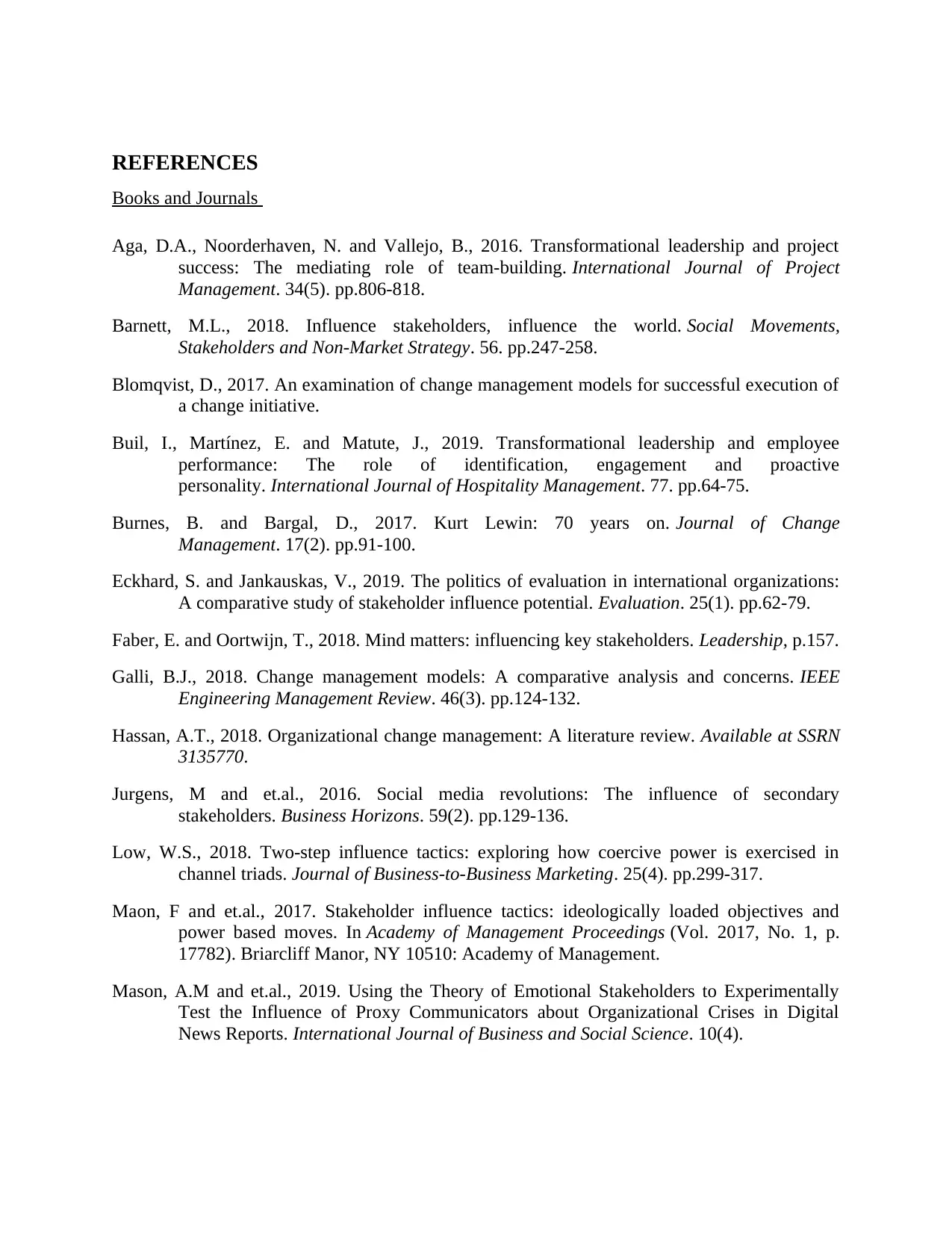
REFERENCES
Books and Journals
Aga, D.A., Noorderhaven, N. and Vallejo, B., 2016. Transformational leadership and project
success: The mediating role of team-building. International Journal of Project
Management. 34(5). pp.806-818.
Barnett, M.L., 2018. Influence stakeholders, influence the world. Social Movements,
Stakeholders and Non-Market Strategy. 56. pp.247-258.
Blomqvist, D., 2017. An examination of change management models for successful execution of
a change initiative.
Buil, I., Martínez, E. and Matute, J., 2019. Transformational leadership and employee
performance: The role of identification, engagement and proactive
personality. International Journal of Hospitality Management. 77. pp.64-75.
Burnes, B. and Bargal, D., 2017. Kurt Lewin: 70 years on. Journal of Change
Management. 17(2). pp.91-100.
Eckhard, S. and Jankauskas, V., 2019. The politics of evaluation in international organizations:
A comparative study of stakeholder influence potential. Evaluation. 25(1). pp.62-79.
Faber, E. and Oortwijn, T., 2018. Mind matters: influencing key stakeholders. Leadership, p.157.
Galli, B.J., 2018. Change management models: A comparative analysis and concerns. IEEE
Engineering Management Review. 46(3). pp.124-132.
Hassan, A.T., 2018. Organizational change management: A literature review. Available at SSRN
3135770.
Jurgens, M and et.al., 2016. Social media revolutions: The influence of secondary
stakeholders. Business Horizons. 59(2). pp.129-136.
Low, W.S., 2018. Two-step influence tactics: exploring how coercive power is exercised in
channel triads. Journal of Business-to-Business Marketing. 25(4). pp.299-317.
Maon, F and et.al., 2017. Stakeholder influence tactics: ideologically loaded objectives and
power based moves. In Academy of Management Proceedings (Vol. 2017, No. 1, p.
17782). Briarcliff Manor, NY 10510: Academy of Management.
Mason, A.M and et.al., 2019. Using the Theory of Emotional Stakeholders to Experimentally
Test the Influence of Proxy Communicators about Organizational Crises in Digital
News Reports. International Journal of Business and Social Science. 10(4).
Books and Journals
Aga, D.A., Noorderhaven, N. and Vallejo, B., 2016. Transformational leadership and project
success: The mediating role of team-building. International Journal of Project
Management. 34(5). pp.806-818.
Barnett, M.L., 2018. Influence stakeholders, influence the world. Social Movements,
Stakeholders and Non-Market Strategy. 56. pp.247-258.
Blomqvist, D., 2017. An examination of change management models for successful execution of
a change initiative.
Buil, I., Martínez, E. and Matute, J., 2019. Transformational leadership and employee
performance: The role of identification, engagement and proactive
personality. International Journal of Hospitality Management. 77. pp.64-75.
Burnes, B. and Bargal, D., 2017. Kurt Lewin: 70 years on. Journal of Change
Management. 17(2). pp.91-100.
Eckhard, S. and Jankauskas, V., 2019. The politics of evaluation in international organizations:
A comparative study of stakeholder influence potential. Evaluation. 25(1). pp.62-79.
Faber, E. and Oortwijn, T., 2018. Mind matters: influencing key stakeholders. Leadership, p.157.
Galli, B.J., 2018. Change management models: A comparative analysis and concerns. IEEE
Engineering Management Review. 46(3). pp.124-132.
Hassan, A.T., 2018. Organizational change management: A literature review. Available at SSRN
3135770.
Jurgens, M and et.al., 2016. Social media revolutions: The influence of secondary
stakeholders. Business Horizons. 59(2). pp.129-136.
Low, W.S., 2018. Two-step influence tactics: exploring how coercive power is exercised in
channel triads. Journal of Business-to-Business Marketing. 25(4). pp.299-317.
Maon, F and et.al., 2017. Stakeholder influence tactics: ideologically loaded objectives and
power based moves. In Academy of Management Proceedings (Vol. 2017, No. 1, p.
17782). Briarcliff Manor, NY 10510: Academy of Management.
Mason, A.M and et.al., 2019. Using the Theory of Emotional Stakeholders to Experimentally
Test the Influence of Proxy Communicators about Organizational Crises in Digital
News Reports. International Journal of Business and Social Science. 10(4).
Secure Best Marks with AI Grader
Need help grading? Try our AI Grader for instant feedback on your assignments.
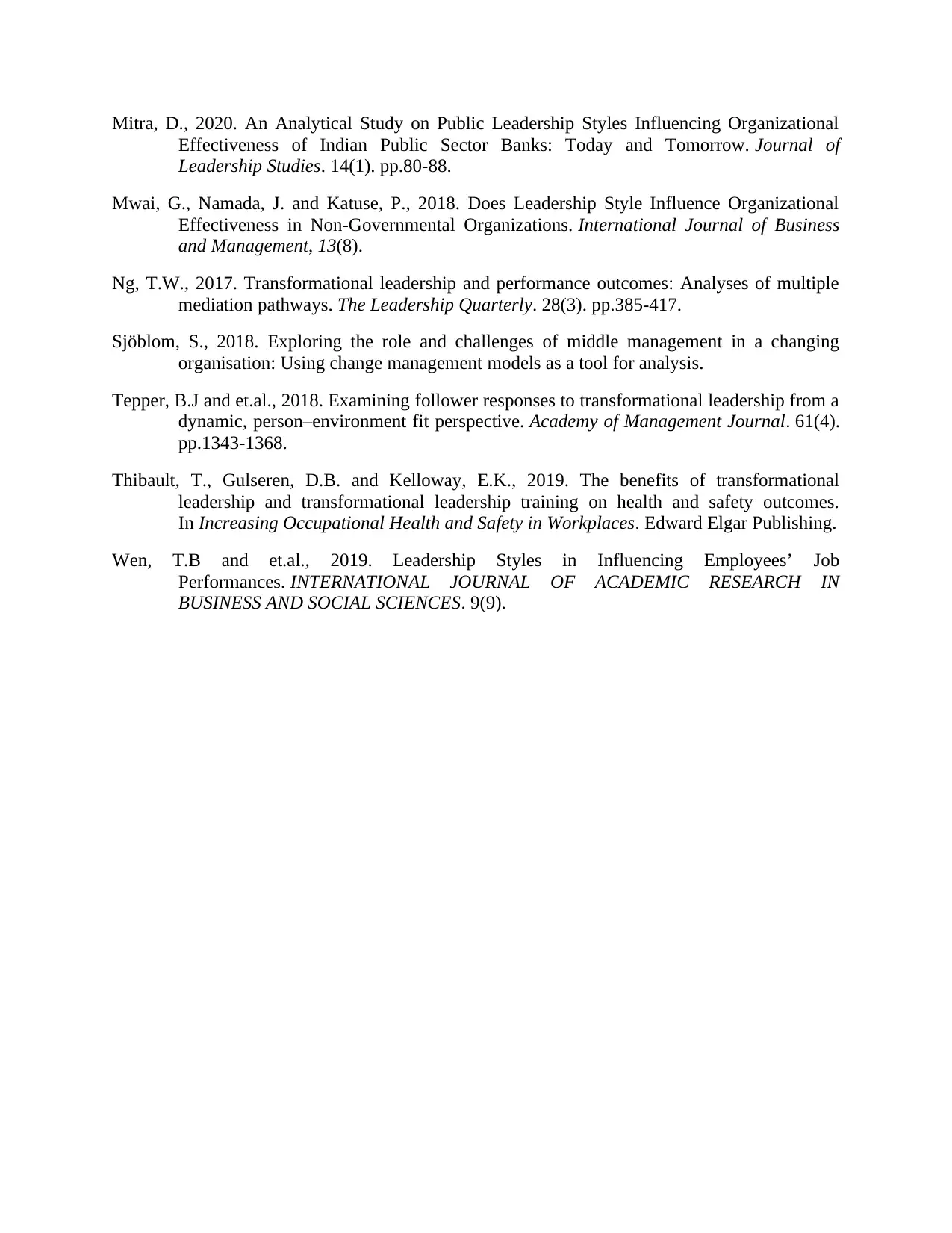
Mitra, D., 2020. An Analytical Study on Public Leadership Styles Influencing Organizational
Effectiveness of Indian Public Sector Banks: Today and Tomorrow. Journal of
Leadership Studies. 14(1). pp.80-88.
Mwai, G., Namada, J. and Katuse, P., 2018. Does Leadership Style Influence Organizational
Effectiveness in Non-Governmental Organizations. International Journal of Business
and Management, 13(8).
Ng, T.W., 2017. Transformational leadership and performance outcomes: Analyses of multiple
mediation pathways. The Leadership Quarterly. 28(3). pp.385-417.
Sjöblom, S., 2018. Exploring the role and challenges of middle management in a changing
organisation: Using change management models as a tool for analysis.
Tepper, B.J and et.al., 2018. Examining follower responses to transformational leadership from a
dynamic, person–environment fit perspective. Academy of Management Journal. 61(4).
pp.1343-1368.
Thibault, T., Gulseren, D.B. and Kelloway, E.K., 2019. The benefits of transformational
leadership and transformational leadership training on health and safety outcomes.
In Increasing Occupational Health and Safety in Workplaces. Edward Elgar Publishing.
Wen, T.B and et.al., 2019. Leadership Styles in Influencing Employees’ Job
Performances. INTERNATIONAL JOURNAL OF ACADEMIC RESEARCH IN
BUSINESS AND SOCIAL SCIENCES. 9(9).
Effectiveness of Indian Public Sector Banks: Today and Tomorrow. Journal of
Leadership Studies. 14(1). pp.80-88.
Mwai, G., Namada, J. and Katuse, P., 2018. Does Leadership Style Influence Organizational
Effectiveness in Non-Governmental Organizations. International Journal of Business
and Management, 13(8).
Ng, T.W., 2017. Transformational leadership and performance outcomes: Analyses of multiple
mediation pathways. The Leadership Quarterly. 28(3). pp.385-417.
Sjöblom, S., 2018. Exploring the role and challenges of middle management in a changing
organisation: Using change management models as a tool for analysis.
Tepper, B.J and et.al., 2018. Examining follower responses to transformational leadership from a
dynamic, person–environment fit perspective. Academy of Management Journal. 61(4).
pp.1343-1368.
Thibault, T., Gulseren, D.B. and Kelloway, E.K., 2019. The benefits of transformational
leadership and transformational leadership training on health and safety outcomes.
In Increasing Occupational Health and Safety in Workplaces. Edward Elgar Publishing.
Wen, T.B and et.al., 2019. Leadership Styles in Influencing Employees’ Job
Performances. INTERNATIONAL JOURNAL OF ACADEMIC RESEARCH IN
BUSINESS AND SOCIAL SCIENCES. 9(9).
1 out of 11
Related Documents
Your All-in-One AI-Powered Toolkit for Academic Success.
+13062052269
info@desklib.com
Available 24*7 on WhatsApp / Email
![[object Object]](/_next/static/media/star-bottom.7253800d.svg)
Unlock your academic potential
© 2024 | Zucol Services PVT LTD | All rights reserved.





